Russia's full-scale invasion has destroyed at least 210,000 buildings in Ukraine, NYT analysis reveals

At least 210,000 buildings in Ukraine have been destroyed since the start of Russia's full-scale invasion, an analysis published on June 4 by The New York Times (NYT) has found.
An examination of satellite data reveals the destruction includes 106 hospitals, 109 churches, temples, mosques and monasteries and 708 schools, colleges and universities.
"The scale is hard to comprehend," the NYT writes in its interactive report. "More buildings have been destroyed in Ukraine than if every building in Manhattan were to be leveled four times over."
The authors note the numbers are "conservative" and don't include Crimea and parts of western Ukraine.
In recent months, Russia has once again ramped up attacks on Ukraine's energy infrastructure, most recently in a mass-missile attack on June 1.
Ukraine's Energy Minister Herman Halushchenko said that energy infrastructure in Zaporizhzhia, Dnipropetrovsk, Donetsk, Kirovohrad, and Ivano-Frankivsk oblasts came under fire by Russian forces.
DTEK, Ukraine's largest private energy company, said that two of its thermal power plants were targeted in the attack, resulting in "serious damage" to the equipment.
Two hydroelectric power stations and nearby infrastructure were also hit, inflicting "critical damage," said Ukrhydronergo, the state-owned hydroelectric energy operator.
Even before the latest attack, Ukraine implemented rolling blackouts. Limitations were introduced on May 15 across the country as energy consumption increased after a temperature drop, according to Ukraine's state-owned energy operator Ukrenergo.
"The capacity of Ukrainian power plants is not enough due to the consequences of five missile and drone attacks carried out by Russia on Ukraine's energy system since March 22," Ukrenergo's statement read.
Russian strikes against Ukraine's energy infrastructure have cost the state over $1 billion in damage, Halushchenko said on May 5.














